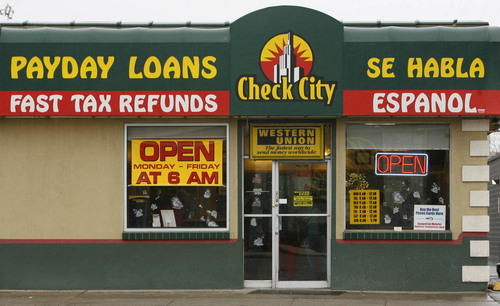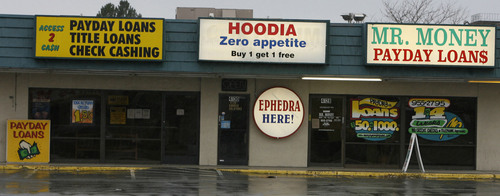This is an archived article that was published on sltrib.com in 2014, and information in the article may be outdated. It is provided only for personal research purposes and may not be reprinted.
Utahns pay among the nation's highest interest rates for payday loans — mainly because it is one of seven states that impose no legal limits on them.
Competition among lenders doesn't tend to lower rates much without limits, according to research released Wednesday by the Pew Charitable Trusts.
"Utah is one of the seven states that allows payday loans but does not limit their costs," Nick Bourke, project director for Pew, told The Salt Lake Tribune. "That tends to drive the prices up, so Utah has among the highest payday loan rates in the country — higher than all the other states that do limit payday loans."
Utah payday lenders charge an average 474 percent annual interest on their loans, according to industry disclosures to the state.
The highest rates in the nation are among the six other states that similarly have no legal limit on interest: Idaho, 582 percent; South Dakota and Wisconsin, both 574 percent; Nevada, 521 percent; and Delaware, 517 percent.
Elsewhere, "The lenders in other states will tend to match the highest allowable rate," Bourke said.
Among states that have storefront payday lenders, the lowest average interest charged is in Colorado at 129 percent, matching its legal limit. The same is true in the next lowest states: Oregon at 156 percent and Maine at 217 percent.
Fifteen states either ban payday loans or set maximum interest rates at 36 percent. None of them has any storefront payday loan stores.
Bourke said lower limits don't tend to decrease overall availability of payday loans. "In states with lower rate limits, we see fewer stores serving more people per store. So access to credit tends to be available."
For example, the study said in the three years after Colorado lowered permissible interest rates, half the payday loan stores there closed. But each remaining store served 80 percent more customers.
The study also says the nation's four largest payday loan companies charge similar rates to each other within any given state, usually at the maximum allowed by law. States with higher limits have more stores, but the rates remain higher and competition does not lower them much.
"This new research shows that payday loan markets are not competitive. And sensible regulation can improve the situation for consumers while still making access to credit available," Bourke said.
The study recommends that states limit "payments to an affordable percentage of a borrower's periodic income. Pew's research indicates that monthly payments above 5 percent of gross monthly income are unaffordable."
Bourke said, on average, a payday loan takes 36 percent of a person's pre-tax paycheck. "Customers simply cannot afford to pay that back and still afford their other financial obligations. This is why you see people ending up borrowing the loans over and over again."
Payday loans usually are issued for two weeks — until a person's next paycheck. In Utah, they can be renewed for up to 10 weeks before state law forces a halt to charging continued interest. But customers sometimes are persuaded to take out new loans to cover old ones to prevent default and legal action.
The Legislature passed some reform this year — but not did not limit interest rates — after the payday loan industry became part of scandals that toppled former Attorney General John Swallow.
The House Special Investigative Committee said payday lenders gave Swallow hundreds of thousands of dollars that he funneled in hard-to-trace ways to help defeat former state Rep. Brad Daw, R-Orem, who had tried to reform the industry. Lenders also gave Swallow big donations he funneled for use against his political opponents.
The reform that passed this year included such things as giving borrowers 60 days after reaching the 10-week limit to pay off the debt without lenders taking further action against them.





